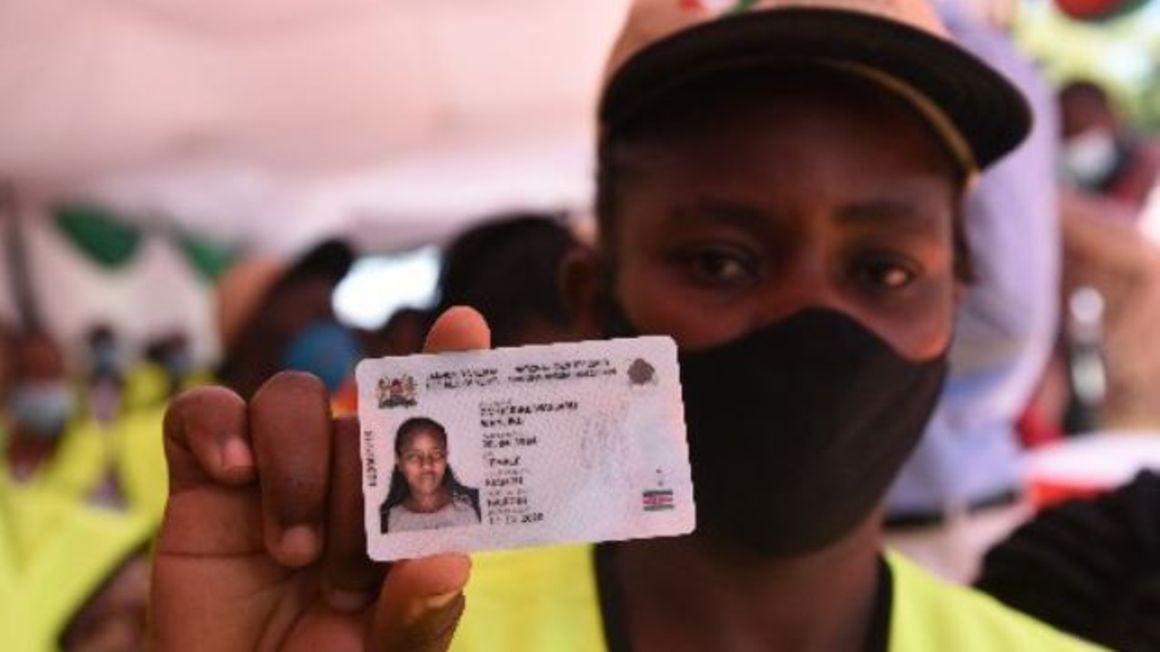
Catherine Wanjiku displays her Huduma Namba card after receiving it from Interior CS Fred Matiang'i at Kiambu County Commissioner's offices on November 18, 2020 during the launch of the national issuance. PHOTO | EVANS HABIL | NMG
Huduma Namba is back in the news. The issuance of Huduma Namba cards to Kenyan citizens and residents, foreign residents, refugees and children begins in December. By Jamhuri Day on December 12, 2021, apparently, our national IDs will serve no purpose in accessing government services.
Eight months later, the (BBI constitutional reform-inspired?) 2022 general election happens. I am not going to ask again what became of the inclusive and progressive initiative that now feels like it’s being foisted on “all in Kenya” (its defined population coverage) in “upende, usipende” (“take it or leave it”) fashion.
I wonder, however, if the people driving this process are working with any sort of do’s and don’ts checklist that guides them through legal, regulatory and institutional arrangements. Kenya already has (yes, too many) rules and structures for the registration of people.
So what and where are the publicly transparent and accountable steps to get this “single source of truth” Huduma Namba thing done properly? That’s before questions like, what public good does it serve; what public bad (or mischief) shall it prevent? That many still ask this says much about our mistrust of public institutions.
There is a broader context to this too. As with the rest of the world, Covid-19 has absolutely disrupted Kenyan lives (health), livelihoods (economy) and living/lifestyle (social), and the earliest I am now reading that we settle into our “New/Next Normal” is 2022. Adapting with agility to this new path – health, economy, social – should be the focus; not political distractions, bureaucratic disruptions and administrative demands. Hell, we’re the most peaceful place in the region right now, so why the noise?
I am a great believer in the leapfrog potential that digitalisation offers Kenya. As I have said before, we have before us a digital silver lining in our Covid-19 cloud, and to be fair, there’s been a mini-boom in across fintech and e-ecommerce around town, as we also discover agritech-and healthtech, and e-delivery and e-logistics become par for the course. Out of necessity; we can re-invent our future.
Here are a couple of extracts from a recent Google-International Finance Corporation report titled e-Conomy Africa 2020 about the continent’s $180 billion future Internet economy. From a $100 billion estimate of the size of the African Internet economy in 2019, to $115 billion in 2020, to a forecast of $180 billion as soon as 2025, and $712 billion in 2050. As shares of the overall economy, that would be digital accounting for 3.9, 4.5, 5.2 and 8.5 per cent in these respective years.
Here’s the report’s assessment of Kenya’s own potential: a $7.42 billion internet economy (7.7 percent of GDP) in 2020 rises to $12.84 billion (9.24 percent of GDP) and $51.07 billion (15.17 percent of GDP). In all years, Kenya’s digital share of the overall economy is highest, and faster increasing as a share across comparators South Africa, Morocco, Senegal, Nigeria, Egypt and the rest of East Africa.
Now here is where the mindset shift needs to happen. It is not fresh air that is going digital but actual sectors.
As the report positively notes, “…a variety of sectors - fintech, e-commerce, healthtech, local transportation, food delivery and business-to-business (B2B) e-logistics – are leading the way in Africa’s digital transformation”. As it further suggests “the Internet economy offers leapfrog opportunities to address challenges faced by Africa’s fast growing number of informal businesses and workers”.
The second part of the mindset shift follows. Government doesn’t create jobs, people and companies do. In the old days, it was said that government was to be enabler and facilitator, not producer. It really hasn’t changed, except for new words like “platforms” and “ecosystems”. That’s the new “enabling environment” - policy, products, people, platforms, private sector, pricing, projects, even planet.
The third part of this mindset shift is what strategy means to government. My experience is that strategy in government happens along a predictable continuum. At one end, is the “wish list” that is never published.
In the middle is the strategic plan as a library archive. At the other end is action underpinned by transparent and accountable citizen engagement. Which describes this administration? Or is ours “off the charts?” - implementation absent of strategy; procurement outside policy?
Here’s my incomplete conclusion. Covid-19 matters most right now; and digital has an important role to play. Is today’s priority to amend the republican part of the constitution to get the state to promote “investment…industrialisation (and)…infrastructure for the digital economy”? More prosaically, is Huduma Namba now the “wrong answer to the right question”? Answers on the back of your ID, please!





No comments :
Post a Comment